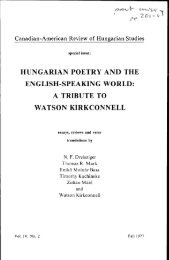HUNGARIAN STUDIES 11. No. 1. Nemzetközi Magyar ... - EPA
HUNGARIAN STUDIES 11. No. 1. Nemzetközi Magyar ... - EPA
HUNGARIAN STUDIES 11. No. 1. Nemzetközi Magyar ... - EPA
- No tags were found...
You also want an ePaper? Increase the reach of your titles
YUMPU automatically turns print PDFs into web optimized ePapers that Google loves.
NATIONAL AND INTERNATIONAL IMPLICATIONS 15It would be easy to continue the line of paradoxes. Most readers agree thatRadnóti's best poems were written at the very end of his life, during themonths spent in a forced labour camp, when he had no hope that the lines hejotted down would be read by anyone. Contrary to the expectations one mighthave, the tone of several late poems is idyllic rather than tragic. Because ofthis, it cannot be taken for granted that Radnóti's posthumous collection canbe read as the voice of a collective fate. It is even more problematic to arguethat the foreshadowing of the Holocaust can be glimpsed in his earliervolumes. While a canon of Holocaust literature has emerged as a result ofseveral studies of the works treating the persecution of Jews during World WarII, any attempt to interpret Radnóti's achievement as belonging to such aninternational canon might run the risk of excluding the majority of his poems.To be sure, some of the usual objections raised against the concept ofHolocaust literature are irrelevant for readers of the Hungarian author. "Thereis no such thing as a literature of the Holocaust, nor can there be. The veryexpression is a contradiction in terms. (...) A novel about Auschwitz is not anovel, or else is not about Auschwitz." 7 This statement made by Elie Wieselor the even more familiar remark that "nach Auschwitz (...) unmöglich ward,(...) Gedichte zu schreiben," 8 can apply only to post-Holocaust works whichcannot claim the kind of authenticity of texts written by victims during thepersecution. The diaries kept by those who suffered have a documentary valuethat is absent from the memoirs called eyewitness, or survivor accounts.Post-Holocaust literature may have a degree of illegitimacy, since there is adanger of pretense in the exploitation of others' pain. Only those texts ofunquestionably high aesthetic quality may be exceptions representing a departurefrom the traditions of imitation or Erlebnis by creating a poetics ofremembrance. In such cases it would be misleading to speak of an imaginativemisappropriation of atrocity. The works of Celan or Pilinszky are obviousexamples.The poems composed by Radnóti in the forced labour camp are less rich inconnotations than Celan's Engßihrung or Pilinszky's Apocrypha, highly cryptictexts in which ambiguities, sudden shifts, enigmatic discontinuities, and thepolyvalence of words create difficulties for the interpreter, but they have anadditional documentary value by representing an unexpected legacy to us fromthe dead. This aspect of Radnóti's late works gives them a significancesupplementing and possibly even surpassing their contribution to Hungarianliterature.Before placing these poems in the larger context of Holocaust literature,several distinctions can be made. First of all, some texts were written inHebrew or Yiddish, others in some languages used by assimilated Jews. A third
















